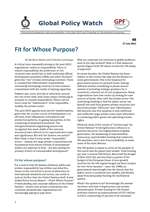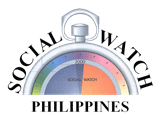Social Watch news
Published on Sat, 2015-08-22 00:00
One of the tools that States have in order to respect, protect and fulfill human rights is the creation of national development banks. Indeed, if the financial sector is left to autonomously determine where capital should be allocated it is likely that private rather than overall social returns will end up determining the allocation of financial savings and investment. National development banks are totally or partially public sector financial institutions mandated to provide credit at terms that render certain socially desirable investments viable. Many countries have relied on them as part of the array of tools to intervene in financial markets and help ensure higher standards of living for their population. |
Published on Thu, 2015-08-20 00:00
Social Watch finds much to criticize in the Czech Republic, sees rising intolerance. Last year, the Czech Republic managed to overcome economic stagnation, but many people in the country are imminently threatened with poverty, according to the annual report that its authors from the Social Watch international network’s Czech branch presented today. Islam and immigrants became new targets of intolerance, while public expressions of hatred of Romanies were less frequent compared with previous years, the report on the situation in the Czech Republic in 2014 says. Though the Czech Republic has a new strategy of promoting equal opportunities for women and men, the implementation of particular steps is stagnating, the report adds. |
Published on Wed, 2015-08-19 09:48
The role of foreign investment in financing development has been a matter of considerable debate in the negotiations leading up to all Financing for Development (FFD) conferences. But deliberations towards the one which took place in Addis Ababa in July 2015 have seen a definite tendency to propose a greater reliance on foreign investment in financing development. It will be important to watch how the Addis Ababa conference frames the regulatory role of the state, and the practices of using aid as an incentive to attract private sector funding, and Public Private Partnerships (PPPs) and institutional investors’ role in closing the infrastructure finance gap. With the transnational corporate sector more involved than ever in defining policies around sustainable development, winning the struggle for the narrative around the contribution of private capital flows to development is a crucial prize at stake in the Financing for Development negotiations in Addis Ababa and beyond. |
| Source: . Published on Wed, 2015-08-19 00:00 |
Published on Tue, 2015-08-18 00:00
The Arab NGO Network for Development (ANND) hosted a meeting on Tuesday August 18, 2015 with Mr. Leonardo SC Castilho, a Human Rights Officer from the Office of the High Commissioner for Human Rights for the United Nations in New York. The meeting comes in the lead up to the UN General Assembly in New York in September – where Sustainable Development goals (SDGs) will be adopted – and a month after the Addis Ababa Conference on Financing for Development (FfD III). The meeting oversaw an interactive discussion between various Lebanese organizations and the representatives from OHCHR on the outcome document of the United Nations Summit for the adoption of the post-2015 development agenda. |
Published on Fri, 2015-08-07 15:02
After over eight months of intergovernmental negotiations in New York and numerous iterations of an outcome document, consensus was reached on the United Nations’ post-2015 development agenda, titled “Transforming Our World: The 2030 Agenda”, on the evening of Sunday 2 August. The talks were scheduled for 20 to 31 July and with continuing differences over several key issues, almost non-stop closed-door negotiations stretched into the weekend. The finalized text will be adopted formally at a Summit on 25-27 September during this year’s UN General Assembly session. The post-2015 agenda’s outcome document consists, at its center, the Sustainable Development Goals (which are built on 17 goals and 169 targets produced by the UN Open Working Group in 2013-2014), as well as a political declaration, a chapter on means of implementation, and a chapter on conclusion on follow-up and review. Together, this agenda is to serve as a foundation for international development cooperation for a period of 15 years, coming into effect on September 2015 and expiring in September 2030. |
Published on Thu, 2015-08-06 00:00
As the financial goalposts for the Sustainable Development Goals (SDGs) to be agreed at the UN’s September summit, were established a few weeks ago at the Financing for Development conference, the elephant in the room remains the role of the private sector in education delivery. It seems that the World Bank and UN have increasingly different visions of how the education goal and children’s right to education should be met. |
Published on Fri, 2015-07-31 18:12
A critical issue repeatedly arising in the post-2015 negotiations relates to responsibility. There is shared responsibility, the preference of rich countries who would like to shift traditional official development assistance (ODA) and other “burdens” given the “rise” of some developing countries. There is common but differentiated responsibility, stressed by developing countries to link common commitment with the reality of varying capacities. Debates also circle, directly or otherwise, around the role of the state, with some camps continuing to promote its central responsibility. Others call for more room for “stakeholders” to be responsible—notably, the private sector. |
Published on Wed, 2015-07-29 21:02
In response to President Benigno Aquino III’s last State of the Nation Address (SONA), Social Watch Philippines (SWP) lead convener Prof. Leonor Magtolis Briones said that the President has failed to fulfill his promises on the matter of social development and protection of the Constitution. According to Briones, based on the Millennium Development Goals target on poverty, the Philippines has not met its 17.2% poverty rate goal. As of the first semester of 2014, poverty incidence remains at 25.8% proving that despite the flagship poverty reduction programs of the government, poverty levels have remained virtually unchanged. It is claimed that the Philippines’ gross domestic product (GDP) has improved, however the GDP goals for 2015 may not be attained. GDP growth does not guarantee that the majority of the Filipinos have felt this economic progress. She stressed that, “Many Filipinos still consider themselves poor and hungry. Claims of robust growth can only be substantiated if they benefit from it. |
Published on Sun, 2015-07-26 00:00
On July 16th, governments adopted the Outcome of the Third Conference on Financing for Development, held in Addis Ababa (Ethiopia), called the “Action Ababa Action Agenda” (AAAA or the “Outcome”). The broad-based disappointment of civil society with an outcome document that has very little to welcome was evident in statement after statement, including the collective one issued by the hundreds of CSOs in the Financing for Development Group. A number of process failures – that some delegates confessed to have never seen in a UN process before — converged to reach the poor outcome. |
SUSCRIBE TO OUR NEWSLETTER










